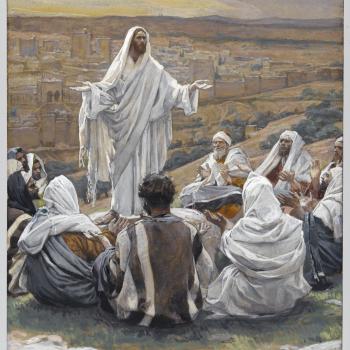After a long while in the spiritual life, most of us come to the point where we realize we’re making very little “progress.” Over and over we come to the shocking realization that the same weaknesses, the same pettiness, the same hardheartedness plague us in ever new and shifting forms. Like germs, mutating to fit every new circumstance and every valiant effort to be slain, these frightful personal demons relentlessly guard us from grace.
Enough, already, we weep. When will I finally become the kind of person I long to be? When will I be free of these pestering, inexorable, agonizing favorites who nourish and feed my selfishness?
I once had a mental vision of sorts, in which I was sitting in the window of a high tower of a castle. Far below me, in the castle yards, servants went to and fro, busy about the duties of maintaining the castle system – innocuous activities like cooking and feeding, sweeping and mending; and less innocent activities, like sharpening swords and pikes, monitoring the level of the moat, and standing watch on the castle walls.
Beyond the walls a militia gathered, led by a fierce general of some kind who contemplated the impregnability of the castle walls and the organization of the defense.
Think, if you will, of Helm’s Deep preparing for the siege.
But no, there was a problem that became apparent the more I contemplated this scene. The enemy at the gates is Our Lord, and all the servants and soldiers busily preserving the castle’s status quo are my retainers, and I have completely lost control over them. This is my castle, my domain, but I have lost all ability to command the lowering of the drawbridge, the surrender, the forfeiting of my own sovereignty. All these busy servants are doing what they have always done, what I have always wanted them to do – keep me isolated, insulated, and autonomous.
But I wasn’t free. I was enslaved by my own wretched will, embodied in all this coordinated defense.
Just this week I came across another helpful description of this strange oppression. A 12th-century monk, Guigo wrote this:
I am in no man’s company, and yet I am not alone. I myself am a crowd. My wild beasts are with me, those whom I have nourished in my heart from childhood. There they have made their lairs which they love so much that even in my loneliness they will not leave me. How often have I protested to them: “Go away from me, wicked ones, so that I may search out the commandments of my God.” It is as though frogs were croaking in my entrails, as if Egypt’s plague of flies were blinding my eyes.
A monk. Much advanced in the ways of the spiritual life. Free of the baggage of the world. And still hounded by the wild beasts in his heart.
And so, the way my mental vision ended, and still does whenever I revisit the castle, is this: I sit in my tower, hanging partly out of the window so I can see the Besieger and he can see me, and I wave a white flag without ceasing. A flag of surrender.
I can’t convince my troops to stand down; I can’t lower the drawbridge; I can’t open the gates – let alone give the Conquering One a warm welcome and crown him my King.
But I can surrender, and hope to God he storms the walls and rescues me from myself.













